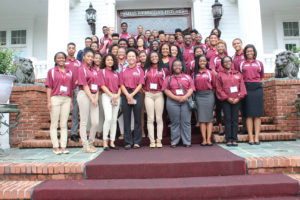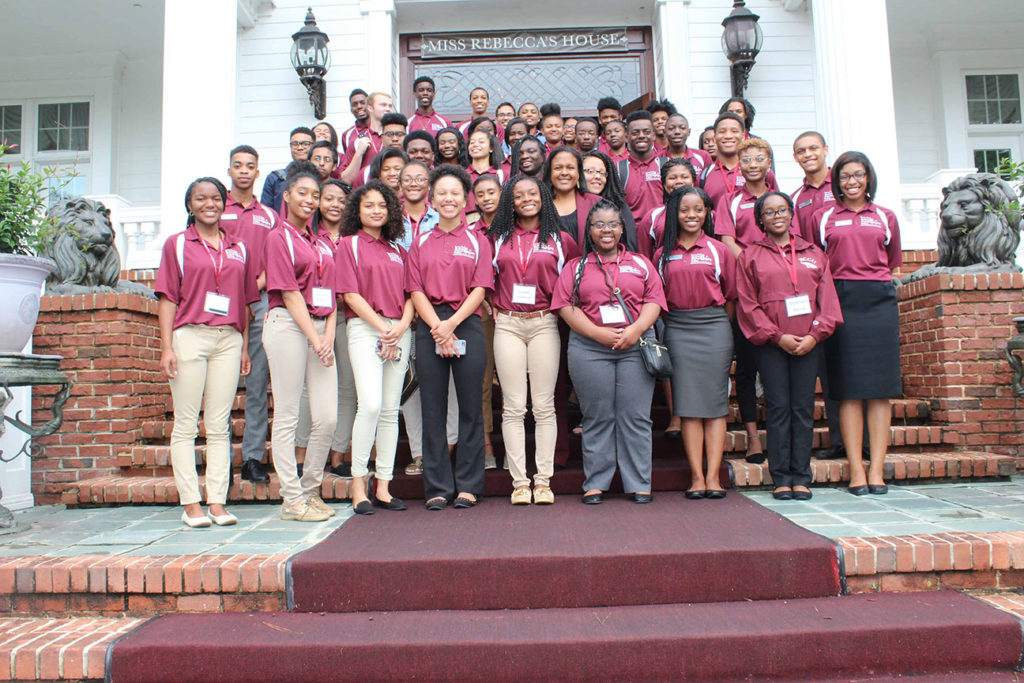Spotlight on North Carolina Central University’s Summer Youth Business and Entrepreneurship Academy (SYBEA) – How Design and Construction Community Can Get Involved

A select group of gifted high school students from across the country arrived on the campus of North Carolina Central University in Durham at the end of June to participate in the 2017 Summer Youth Business and Entrepreneurship Academy (SYBEA) hosted by NCCU’s School of Business.
The residential Academy is open to high achieving minority youth in rising 10th, 11th and 12th grade, with a B average (3.0) or higher. Selected students receive business training and exposure to higher education on the campus of NCCU, along with a full scholarship to cover the cost of attendance plus room and board.
Now in its sixth year, the week-long SYBEA is a unique and highly competitive collegiate immersion experience whereby the students are swiftly thrust into the study of business principles through workshops, lectures, entrepreneurial engagements, live case study competition experiences, and an out-of town trip. Each year the Academy engages in a different theme. The 2017 theme was “Scalable Minority Businesses in a Global Economy.” This summer’s academy introduced students to businesses that have not only maintained exceptional success and sustainability, but have broken barriers that may have at one time prohibited this kind of profitability and wealth.
“Everything we learned, everyone we met, and everyone who shared their story really inspired me to get going and start my own business,” said Carmen Haywood, a junior at Wake Forest (N.C.) High School.
After watching yet another class of scholars excel and inspire, SYBEA Program Director, Keisha Williams has already begun planning for the 2018 Academy. Williams spoke exclusively with GroundBreak Carolinas about her vision for SYBEA and how she sees a distinct opportunity for collaboration and partnership with North Carolina’s design and construction community.
What’s the underlying objective of SYBEA, the ultimate takeaway?
Of this year’s 40 participants, approximately 35 percent reside in one of North Carolina’s 80 rural counties. Understanding that the economic disparities in these areas are typically most dense in communities of color, the level of impact realized by the kind of engagement provided by SYBEA is transformative. After their Academy experience, these scholars return to their home towns with fundamental business principles, entrepreneurial expertise and an unapologetic drive to continue their educational pursuits. What we try to do is give them some tools that will help them play a leadership role in revitalizing their communities by becoming job creators down the road.
What makes the Architecture, Engineering and Construction Industry a good fit?
Considering the workforce challenges in both residential and commercial construction, this could be a win-win for NCCU and the Carolinas construction community. The Academy would like to further explore the introduction of Construction as a practice of ownership and executive development. SYBEA scholars have a unique opportunity to learn skills that are applicable to their lives and usable in their communities. As SYBEA continues to grow and become more aligned with the needs of its scholars, students will be introduced to even more opportunities to make direct impact on local industries. As we embark upon the planning for the 2018 cohort of scholars, the Academy intends to focus on the challenges of Rural America. Census data shows that economies in rural counties are diverse and not necessarily dependent on farming or manufacturing. In fact, nearly 8.9% of the population in the civilian labor force is employed by the construction industry.
Tell us a little bit about SYBEA Summer 2017 Student Experience.
Throughout their Academy experience, the students facilitated a live case study with an actual business. This year’s participating business -located near downtown Durham – is affiliated with the hospitality industry. Academy participants were charged with interviewing the business owner, studying the business’ history, researching the market, and developing a strategic approach to solving a specific challenge faced by the company. They studied the interworking of this growing enterprise while intensively researching the owner’s approach to quality product and service in preparation of his impending expansion. The business owner was impressed with the students’ presentations and intends to use the feedback from all of the presentations to continue to grow and evolve his business.
The Summer 2017 Academy experience culminated with a trip to Charlotte where the group of Academy students visited with Charlotte Hornets executives. While in Charlotte, they also had the chance to take a special tour of the Innovative Marriott City Center concept hotel. Next, the students traveled to the Allen Entrepreneurial Institute in Lithonia, Ga., where they had the unique opportunity to interact with successful entrepreneurs. The students then returned to Durham for the closing session.
How can AEC companies in North Carolina — or even South Carolina — get involved in 2018?
In order for NCCU’s School of Business to continue this outreach, is it critically important that the Academy is financially supported in ways that will continue to strengthen the outreach and shape the impact. From curriculum development to workshops and site visits, there are many opportunities for construction companies to work with SYBEA in 2018. We invite all interested organizations to partner with us so that we can continue to provide a stellar academic engagement poised to ignite the economic integration of students in their communities.
For more information, contact Keisha Williams at kmark3@nccu.edu.







